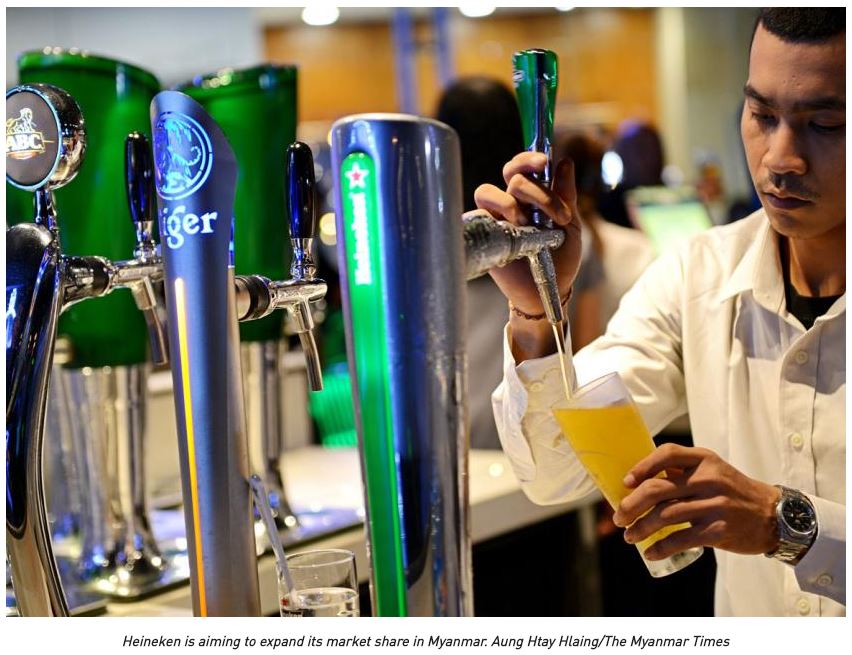Myanmar: Heineken raises sustainability efforts as competition heats up
Heineken Myanmar is raising its corporate social responsibility (CSR) efforts as it commits to running a long term, sustainable brewing business in the country.
Last year, the Dutch brewer reduced its carbon emissions by 17 percent per hectoliter of beer produced compared to the year before. It also reduced the volume of water used to brew a hectoliter of beer by 33pc over the same period, Mr Rene Sanchez Valle, managing director of Heineken Myanmar, said last week.
“We made significant improvements on our environmental performance and increased the contribution we made economically and socially,” Mr Valle said.
Heineken has also invested $10 million in a wastewater treatment facility and pipeline, which became operational in 2017. As a result, the company managed to recycle more than 70pc of the waste generated instead of sending it to a landfill.
Meanwhile, all of Heineken’s 330 ml cans are now sourced locally and all refrigerators provided to bars and restaurants are eco-friendly, Heineken said.
Last year, the company paid a total of $15 million in taxes to the Myanmar government.
Mr Valle said Heineken expects to continue improving its sustainability efforts in 2018 and building a reputation for itself in championing responsible drinking. It recently joined with rivals Myanmar Brewery – which brews Myanmar Beer- and Carlsberg Myanmar to organise a responsible drinking campaign over the Thingyan Festival.
Expanding market share
Heineken’s CSR efforts are also part of a wider push to create more awareness for its beers as it strives to expand its market share in Myanmar.
Currently, the company brews the Heineken, Tiger and Regal Seven beer brands as well ABC Extra Stout in Myanmar. Last October, it launched Tiger Crystal, a beer with lower alcohol content, to appeal to younger drinkers in the country.
Heineken Myanmar is 57 pc owned by Heineken, while Alliance Brewery Company holds the remaining 43 pc. It operates a brewery in Hmawbi township, outside of Yangon.
Last October, Heineken had said that the beer market in Myanmar is still relatively small compared to the rest of the region, with consumption now just around 6 liters per person per year in Myanmar compared to 40 liters in Vietnam and 70 liters in The Netherlands.
As such, beer consumption is expected to grow swiftly in the years ahead. By 2021, the beer market is expected to reach 900,000 kiloliters, up 80pc from 2016, according to research firm Euromonitor International.
More competition
Heineken will not be the only foreign brewer competing for the region’s fastest growing market. Japanese brewer Kirin Holdings is reported to be scaling up its Yangon-based Myanmar Brewery.
According to Nikkei Asian Review, Kirin is planning to expand the brewery into one of its largest in the world. The brewer is reported to be starting a new canned beer this month.
Kirin will also expand Mandalay Brewery, the brewer of Mandalay Lager Beer. The Japanese brewer last year took a stake in Mandalay Brewery, Myanmar’s oldest brewer, together with military-linked Myanmar Economic Holdings.
Other prominent brewers are also eyeing the beer market. Just last month, Emerald Brewery received approval from the Myanmar Investment Commission to manufacture and distribute beer in the country.
Emerald Brewery is a joint venture involving Singapore’s Fraser & Neave (F&N) and Myanmar’s Than Lwin Aye Yar Industrial Production & Construction Company.
In 2015, F&N had sold its stake in Myanmar Brewery to Kirin for $560 million.
F&N is also a subsidiary of Thai Beverage, which brews Beer Chang, one of Thailand’s two top beers.
F&N used to co-own a stake in Asia Pacific Breweries (APB) together with Heineken. In 2012, Heineken bought F&N’s stake in APB for $4.5 billion.
Source: https://www.mmtimes.com/news/heineken-raises-sustainability-efforts-competition-heats.html


 Thailand
Thailand




